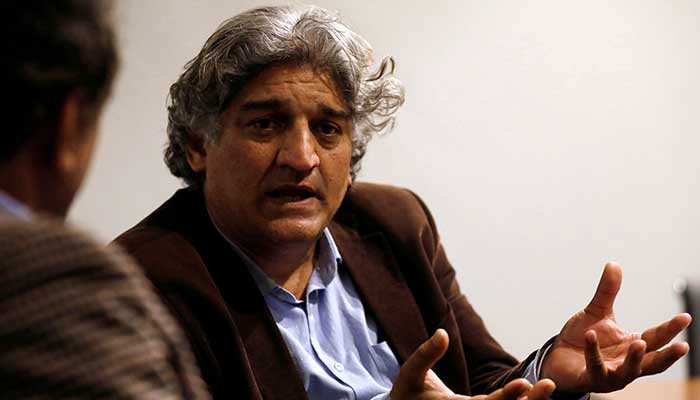Targeting the messenger
This is not first time Matiullah Jan has found himself in crosshairs of state
The recent arrest of senior journalist Matiullah Jan by the Islamabad Police, on charges of assaulting police officers, forcibly seizing their weapons, and issuing threats, is nothing short of alarming. To make matters worse, authorities claim that Jan was under the influence of drugs, with ‘Ice’ purportedly found in his vehicle. These allegations are not only absurd but an affront to the principle of justice, exposing the state’s troubling tendency to manipulate the legal system for political ends. In a swift response, the Islamabad High Court (IHC) suspended Jan’s two-day physical remand, which had been granted by an anti-terrorism court (ATC) in a case that also involves anti-narcotics charges. This judicial intervention highlights the precariousness of Jan’s situation, but also underscores the heavy-handed tactics that are usually employed against journalists. Media bodies across Pakistan, including the Association of Electronic Media Editors and News Directors (AEMEND) and the Pakistan Federal Union of Journalists (PFUJ), have vehemently condemned Matiullah Jan’s arrest, calling for his immediate release. International watchdogs, such as the Committee to Protect Journalists (CPJ), have also echoed these calls, emphasising that such arbitrary actions are a direct attack on press freedom.
This is not the first time Matiullah Jan has found himself in the crosshairs of the state. Back in July 2020, he was abducted by a group of men in Islamabad, an incident that sent shockwaves through the media community. In Pakistan, journalists already face a host of challenges – censorship, online harassment, threats to their safety, delayed payments – and such incidents further exacerbate the climate of fear. Observers have suggested that Jan’s coverage of the PTI’s recent protest was the issue. But here’s the thing: if there is any legitimate reason to find fault with any journalist’s reporting, why not counter it with facts and evidence? Coming up with FIRs that belie logic is hardly a win for anyone. Even Adviser to the Prime Minister on Political Affairs Rana Sanaullah has denounced the charges as “fabricated”. The decision to use charges like terrorism and narcotics possession is an act of overreach, against all principles of rule of law.
There is a disturbing pattern in Pakistan where journalists are selectively targeted. This does not mean there is no disinformation in the country. There are parts of the media that are complicit in spreading disinformation, but there are no constructive efforts to hold them accountable. Instead, the state often seeks to silence critics by levying charges that have little to do with their work as journalists. In this environment, it is impossible to foster meaningful debate or discussion, and the erosion of press freedom becomes inevitable. While the media itself must take responsibility for irresponsible reporting, it is crucial that the state refrains from using oppressive tactics to silence dissent. Journalism is not a crime. A journalist’s role is to inform, to challenge, and to hold those in power accountable. Disagreeing with a journalist’s perspective or reporting does not justify penalising them on a whim. Such steps represent a dangerous precedent for press freedom in Pakistan. If left unchallenged, they could embolden further crackdowns on free speech, turning Pakistan into a place where dissent is not tolerated and where journalists are treated as criminals for simply doing their jobs. We must defend the fundamental right to a free press or risk sliding further into a climate of repression and fear.
-
 Lucy Boynton Tapped To Star In 'Knight Of The Seven Kingdoms' Season 2
Lucy Boynton Tapped To Star In 'Knight Of The Seven Kingdoms' Season 2 -
 Sarah J. Maas To Drop Bombshell On 'Call Her Daddy' Podcast About ACOTAR 6?
Sarah J. Maas To Drop Bombshell On 'Call Her Daddy' Podcast About ACOTAR 6? -
 Virginia Giuffre Continues To Haunt Buckingham Palace
Virginia Giuffre Continues To Haunt Buckingham Palace -
 Thomas Fugate: Trump's Pick For Terrorism Prevention Renews Concerns Amid War
Thomas Fugate: Trump's Pick For Terrorism Prevention Renews Concerns Amid War -
 Meghan Markle Insider Finally Drops What Coming To ‘As Ever’
Meghan Markle Insider Finally Drops What Coming To ‘As Ever’ -
 Rachel Lindsay Slams Ex Bryan Abasolo For Lying About Her Fertility Struggles
Rachel Lindsay Slams Ex Bryan Abasolo For Lying About Her Fertility Struggles -
 Prince William's Ongoing Nightmare With Andrew Takes A New Turn
Prince William's Ongoing Nightmare With Andrew Takes A New Turn -
 Selena Gomez Reveals Sweet Reason For Wanting Big Family Revealed On Podcast
Selena Gomez Reveals Sweet Reason For Wanting Big Family Revealed On Podcast -
 Zendaya Revealed One Accent She Would Like To Pull Off One Day After Taking Major Step With Tom Holland
Zendaya Revealed One Accent She Would Like To Pull Off One Day After Taking Major Step With Tom Holland -
 Starlink Bridges Digital Divide: Global Internet Now Reaching World’s Most Remote Regions
Starlink Bridges Digital Divide: Global Internet Now Reaching World’s Most Remote Regions -
 'An Avengers Movie Every 20 Minutes': Seth MacFarlane Gets Candid About Taxing 'Ted' Production
'An Avengers Movie Every 20 Minutes': Seth MacFarlane Gets Candid About Taxing 'Ted' Production -
 Prince William, Kate Middleton 'drastic Measures' For Future Of Monarchy Exposed As Pressure Mounts
Prince William, Kate Middleton 'drastic Measures' For Future Of Monarchy Exposed As Pressure Mounts -
 David, Victoria Beckham Send Lovely Birthday Wishes To Son Brooklyn Despite Feud
David, Victoria Beckham Send Lovely Birthday Wishes To Son Brooklyn Despite Feud -
 'Sinners' Star Recalls One Of The Coolest Scenes From Filming
'Sinners' Star Recalls One Of The Coolest Scenes From Filming -
 Eco-fashion Designer Amanda Navaian Sues King Charles Charity
Eco-fashion Designer Amanda Navaian Sues King Charles Charity -
 MGK's Flirty Comment On Megan Fox's Sultry Pics Fuels Reunion Buzz
MGK's Flirty Comment On Megan Fox's Sultry Pics Fuels Reunion Buzz




